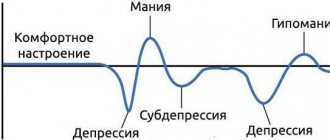People who strive to constantly be the center of attention, childishly reacting with tears and hysterics to the prohibitions and busyness of other people, are also childishly self-centered. Creative personalities with a fragile inner world and a vulnerable soul? Or people with hysterical disorder?
The essence of the disorder
People with hysterical disorder (hysterical disorder) look unusual, bright, theatrical. Their behavior and appearance are provocative and seductive. They are asking for compliments. They want to be the center of attention at any cost. They say about them “negative PR is also PR.” For inattention to their own person, hysterical individuals punish others with irritation, aggression and resentment.
At the same time, hysterical individuals suffer from unstable self-esteem. They strive to please and please everyone. They take all relationships too closely, and react to all events very emotionally. This makes them easily disappointed in people and suffer over little things.
Others see them as insincere. First of all, precisely because of the intensity of emotions and violent reactions to trivial things.
Hysterical individuals are characterized by repression. They choose from life and events what they like and benefit from, which will create drama. Very often important details are left out. In relationships, such omissions provoke conflicts.
Some scientific sources classify histrionic disorder as a borderline disorder. Indeed, in both cases, individuals are distinguished by emotional instability and a pronounced dependence of the individual’s state on the opinions and assessments of the environment. And also in both cases, the person is only capable of unstable and superficial relationships.
Mysterious illness
People suffering from hysterical disorder tend to invent and attribute to themselves the presence of unexplained diseases. They colorfully describe symptoms, go into detail, and show dramatic reenactments. Their condition is often accompanied by autonomic disorders that reach extreme levels of manifestation: fainting, attacks of suffocation, nausea, loss of voice, sensitivity, immobility of the limbs.
In search of sympathy and attention, they often visit hospitals, pretending to be sick and helpless. If little attention is paid to them, the attacks intensify. Seeing that they are being watched, patients with hysterical personality disorder perfectly play the role of the sick person. But when they are distracted and forgotten, their condition suddenly improves.
The patient consulted a doctor with complaints of constant weakness and fatigue. I was worried about insomnia, frequent dizziness, and trembling of the limbs. “There are times when my legs give out.” She claimed that she suffered complete paralysis of her arms and legs twice. However, in both cases everything was somehow restored mysteriously. She complained about being in a bad mood.
On examination: she is too cutesy, tries to imitate a staggering gait, loses consciousness. Expresses apathy, worry about the future, talks about his imminent death. Complains of memory loss. But when surrounded exclusively by patients, she transforms, becomes cheerful, sociable, and the lost memory suddenly returns. At a meeting with her husband she becomes a flirtatious, attractive young woman.
Causes of the disorder
The roots of the disorder go back to childhood:
- Probably, the parents did not notice the child, were busy with work, and paid attention only when the child was ill. The feeling of uselessness and loneliness, unsatisfied desires and needs of the child are prerequisites for the development of hysterical disorder.
- Demanding parents who force the child to deserve love is another possible reason.
- Another unfavorable family upbringing style that can lead to hysterical disorder is “family idol” upbringing. Indulging in the whims of a child and elevating his personality to a cult is also not beneficial.
Symptoms
The main symptoms of hysterical disorder include:
- regularly seeking the attention of others;
- inconsistency in affections, interests and relationships;
- whims;
- an irresistible and uncontrollable desire to be in the center of being taken out due to admiration, surprise or pity (it doesn’t matter).
For people with hysterical disorder, there is nothing worse than indifference, so even the image of a negative hero will do. In order to attract attention, it is often used:
- extravagant and defiant appearance;
- boasting;
- lie;
- fantasies;
- inventing diseases with very real (psychosomatic) demonstration of symptoms (spasms, nausea, suffocation, numbness or iciness of the limbs).
Knowledge and thoughts are often superficial, but at the same time a person strives to look better and knowledgeable in everything. Because of this, it often looks ridiculous and stupid. And if he manages to interest someone in the primary “top of the sciences,” then this will not last long. Upon closer acquaintance, the inner emptiness makes itself felt and the interlocutor’s interest disappears. It should be noted that the desire to be noticed in a hysterical person is still stronger than the desire to be the best.
Hysterical personalities are suggestible and very susceptible to the influence of others. Their whole life is a theater; for every action they need spectators. Each of their actions is endowed with elements of drama.
Defending, especially sensitive hysteroids are classified into a special group. They are anxious and shy, infantile. Their inner world is complex, the individuals themselves suffer from feelings of inferiority and increased reflection. Infantility and fragility manifest themselves at the level of not only the psyche, but also physiology. However, naivety and frankness are often feigned. Inside there are individuals with an iron grip and resourcefulness in life. They manipulate people with their weakness and whims.
Behavior is often theatrical in nature, gender affiliation is cultivated. Probably the phrase “I am a woman, I need to be pursued. I need attention. I can be moody” often refers to a personality disorder. After all, this pathology is more common in women.
The likelihood of developing hysterical disorder in women is higher provided that at a young age the girl managed to overcome problems in interpersonal relationships through theatrical behavior. Then such behavior could become entrenched as a stereotype.
Article for the All-Russian scientific and practical conference with international participation “Current problems of psychology in education” (March 12 - 14, 2021) Murmansk State Arctic University (MASU) together with the Murmansk regional branch of the Russian Psychological Society. UDC 316.4(08) / BBK 60.52.ya43 S69
Author. T.M. Dyachenko. Department of Psychology, Glendale Community College, Glendade, Arizona. USA
Annotation. The article discusses the symptoms and additional features of histrionic personality disorder described in various sources. Examples of real clinical cases and observations are given.
Key words: personality disorder, histrionic personality disorder, symptoms, personality
Symptoms of histrionic personality disorder in examples
Histrionic personality disorder (HPD) is classified as a Cluster B personality disorder in the DSM-5. A personality disorder is a persistent, cross-situational, rigid pattern of internal experiences and behavior that deviates from culturally expected patterns and is associated with significant distress and maladjustment[1].
Cluster “B” is characterized by emotional instability, unpredictability of thoughts and behavior, and a tendency to dramatize or get involved in it. In turn, hysterical personality disorder is characterized by increased emotionality and a desire to attract attention. It has eight symptoms:
1) a feeling of discomfort in situations where a person is not the center of attention;
2) provocative, seductive behavior that is inappropriate to the situation;
3) rapidly changing, superficial emotions;
4) constant use of appearance to attract attention;
5) an impressionistic style of speech with a lack of attention to detail;
6) demonstrative, theatrical behavior, exaggerated emotions, dramatization;
7) high suggestibility;
 exaggeration of assessment of relationship closeness.
exaggeration of assessment of relationship closeness.
In Russian psychiatry, personality disorders are called psychopathy. Hysterical psychopathy, described by P.B. Gannushkny, includes: “1) the desire to attract the attention of others at all costs and 2) the absence of objective truth, both in relation to others and to oneself (distortion of real ratios) [2]".
According to the International Statistical Classification of Diseases and Problems ICD-10, personality disorder manifests itself in the maladaptive functioning of various aspects of the self (self-esteem, self-regulation, identity, self-image) and problems in interpersonal relationships (the ability to maintain mutually satisfying close relationships, understand the point of view of another , resolve conflicts). Impairments manifest themselves in the cognitive, emotional and behavioral spheres. Such violations last for at least two years. Histrionic personality disorder manifests itself in the following symptoms:
a) self-dramatization, theatricality, exaggerated expression of emotions;
b) suggestibility, the ability to easily succumb to the influence of others or circumstances;
c) superficiality and lability of emotionality;
d) constant desire for excitement, recognition from others and activities in which the patient is the center of attention;
e) seductiveness in appearance and behavior inappropriate to the situation;
f) excessive preoccupation with physical attractiveness[3].
In this article we will use the DSM-5 diagnostic criteria as a basis. According to the DSM-5, the disorder can be diagnosed at age 18, and symptoms must have been present in many situations for at least a year. For histrionic personality disorder, at least five of the above symptoms must be present.
Each symptom is illustrated with descriptive examples. The descriptions are partly taken from case studies of my clients, and partly based on my observations from life.
Symptoms of Histrionic Personality Disorder:
- A feeling of discomfort in situations where a person is not the center of attention.
Irina wants to move in the circles of very famous people and believes that she can be a hostess at receptions for figures famous in science and art. In her imagination, at such an event, all eyes are directed at her, because she is in a magnificent dress, beautiful, smart, well-born. But for some reason no one appreciates her abilities, she is not invited to organize receptions, and she works as an accountant and suffers from the inability to be in the place where she deserves to be by birthright. That's why she's depressed.
For hysterics, attention, especially from high-status people, is very important. But the motivation and discipline to achieve the goal is often lacking, which conflicts with the need for attention. This leads to depression.
- Provocative, seductive behavior that is inappropriate to the situation.
Alena brought her future husband to meet her mother. The IPD mom dresses in her best low-cut dress and has a nice hairstyle. During the visit, she is very welcoming, hospitable and admires the guest. Gradually, Alena’s mother begins to flirt with the guy and talk about sexual topics. At the end of the evening he asks his future son-in-law: “Do Alena and I really look like sisters?”
People with hysterical personality disorder are even ready to destroy the happiness of their children just to get confirmation of their beauty, youth and attention.
- Rapidly changing, superficial emotions.
Varvara suffers for her dead husband. She sobs loudly at the funeral, throws herself on the coffin and does not allow it to be buried. They grab her by the arms, carry her away from the grave in her arms, barely alive, and give her a sedative. When she arrives home, she calmly sits down to watch a comedy and laughs merrily. No traces of grief are visible. The next day, Varvara goes out into the street and, meeting with neighbors, tells how she suffers and cries inconsolably day and night, tears of deep suffering flow from her eyes. After 15 minutes, she enters the store and begins to flirt with the male salesperson.
Vividly expressed emotions serve as a means for hysterics to attract attention, so feelings change in accordance with what kind of “scene” and what kind of audience.
- Constantly using appearance to attract attention.
Since childhood, Anna wanted to be beautiful, and when she turned 15, she began to dream of meeting her one and only. She began to dress in very short and tight dresses. One day, at a disco, her friend's boyfriend invited them to drink champagne. The girls were brought to some kind of brothel, and they miraculously escaped from there. But Anya did not give up her dream of meeting that same prince. And she continued her search, dressing very flashy and sexy - each time she found herself in situations of attempted rape or sexual violence.
Girls with hysterical personality disorder, due to their rich imagination, are in illusions that do not correspond to reality. They think that sexual behavior will give them the attention and care they want. But this makes them less discreet and they often become victims of sexual violence.
- An impressionistic style of speech with a lack of attention to detail.
Marina talks about how the young man loves her, but she doesn’t give any examples or proof of love: “He’s so cool and attentive, he’s crazy about me.”
Vera talks about a wonderful new project, but cannot describe specific goals and expected results. He speaks in general terms and with exaggerated emotions: “We will create a new structure that will help people, we will move forward, we will be at the forefront of science, new talents will develop around us.”
The point of such speeches, apparently, is to force those around her to listen, trying to find at least some meaning, and therefore to give her especially concentrated attention.
- Demonstrative, theatrical behavior, exaggerated emotions, dramatization.
Anastasia talks about the unworthy behavior of her tyrant and alcoholic husband every time she meets with her friends. She very vividly and in person describes scenes of conflict, violence, depicts her emotions, and in the most intense moments she begins to cry, using such strong exclamations: “this is unbearable,” “he is an amazing scoundrel,” “colossal selfishness.” When her husband died, she, with the same vivid epithets, emotions and tears, told her friends how she saw her husband in her dreams, how she loved him amazingly, felt enormous melancholy and cried day and night. Her life was divided into two parts: one - real, and the other - in dreams with her dear unforgettable husband. When her friends, tired of her stories, leave, Anastasia immediately stops crying and forgets about her husband.
Apparently, dramatized stories about her husband are just an excuse to attract attention and be on stage. When there is no scene, there is no drama.
- High suggestibility (quickly influenced by others or the situation).
In counseling, hysterical clients respond very well to techniques such as visualization, imagery, and symbolic drama. They believe the prognosis is good and are cured quickly.
I told one client with IPD who was desperate to find personal happiness: “You can meet a man and create a romantic relationship.” Six months later she got married. I don’t know how happy she is and I’m afraid to ask.
A positive prognosis from a specialist can give people with IPD strength and allow them to feel better due to increased suggestibility. Cases of miraculous healing are just about hysterical personality disorder. Although, in my opinion, to overcome a personality disorder you need long and painstaking work with a psychologist for two to three years.
According to hypnotizability research, high suggestibility is correlated with a rich imagination[4]. Apparently, imagination allows hysterics to self-hypnotize both the bad (losing caution in relationships) and the good (getting rid of negative symptoms).
- Exaggerating the assessment of the closeness of relationships (considering them closer than they actually are).
My client Oksana talks about the betrayal of her boyfriend, a famous film actor, with indignation: “We had such a wonderful relationship, he loved me - and now he stopped loving me, he doesn’t even write. Where did his love go? After all, I felt, I saw how much he loved me and wanted me, he devoured me with his eyes. And now I feel cold from him. I don’t know what I did that made him stop loving me.” Based on such an impressionistic, non-detailed description (symptom No. 5), the image of a scoundrel-womanizer appears. But upon further questioning, it turned out that from the very beginning of their “relationship” the young man only occasionally met Oksana at the university, they had joint group events, and were almost never alone. And the only time they were left alone in the audience and talked about this and that, she interpreted it as a declaration of love (“He looked at me like that. He fell in love with me. I know and he knows that he is my destiny.”) .
When I told Oksana that there was never love on his part, because there wasn’t even a relationship, she quickly believed (symptom No. 7 - suggestibility) and immediately stopped loving him (symptom No. 3 - superficial feelings).
Exaggeration of the perception of the degree of love, closeness of another and his feelings is based on the ability for self-hypnosis and the acute need for attention and care of hysterics.
People with IPD may also be prone to physical symptoms. An example is conversion disorder, in which the legs are paralyzed, the voice disappears, and vision is impaired for no physiological reason. Such cases were described by Freud and Breir in the book “A Study of Hysteria.” These symptoms also serve to attract attention or provide secondary benefits to the disease[5]. Proneness to conversion disorders is also described in DSM-5[6].
Patients with IPD also have an increased risk of suicidal behavior. Typically, suicide attempts are made publicly as demonstrative acts in order to attract attention or force better care of the patient[7].
According to ICD-10, histrionic disorder includes additional features such as self-centeredness, self-indulgence, and increased resentment[8].
So, there are positive aspects to working with clients with IPD: they can be helped to quickly get rid of somatic symptoms, anxiety and unproductive relationships. However, personality restructuring requires long work aimed at understanding defense mechanisms, as well as overcoming victimization and the desire for attention.
References
[1] American Psychiatric Association. (2013). Diagnostic and statistical manual of mental disorders (5th ed.). Washington, DC: Author, p.667
[2] P.B. Gannushkin (1933) Clinic of psychopathy: their statics, dynamics, systematics. Moscow, Publishing house "North".
[3] International Statistical Classification of Diseases and Related Health Problems: Tenth Revision. — Moscow: Medicine.
[4] Barber, T. X., Wilson, S. C. (1978). The Barber Suggestibility Scale and the Creative Imagination Scale: Experimental and clinical applications. American Journal of Clinical Hypnosis, 21: 84-108.
[5] Breuer, Josef and Freud, Sigmund (1895/1995), Studies on Hysteria. In James Strachey (Ed.) The Standard Edition of the Complete Psychological Works of Sigmund Freud. London: Hogarth Press, Vol.2, xxxii, pp. 1–335
[6] - American Psychiatric Association. (2013). Diagnostic and statistical manual of mental disorders (5th ed.). Washington, DC: Author, p. 668
[8] International Statistical Classification of Diseases and Related Health Problems: Tenth Revision. — Moscow: Medicine
Comments
0 Natalia 03/13/2020 19:58 Thank you, I enjoyed reading it, very interesting, valuable information.
Quote Update list of comments RSS feed of comments for this entry
Add a comment
JComments
Diagnostics
Hysterical disorder is diagnosed if at least 4 of the following symptoms are present:
- ostentatious and theatrical behavior, exaggerated expression of feelings (for example, sobbing excitedly, wide hugs, bows);
- suggestibility and ease of being influenced from outside (people or situations);
- frequent changes between pessimistic and optimistic states;
- regularly seeking out exciting experiences and activities that will allow you to be the center of attention;
- inadequate demonstration and emphasis of sexuality (gender) in appearance and behavior;
- expressed concern about external attractiveness.
Diagnosis and treatment
To make a diagnosis of “hysterical personality disorder,” a pathopsychological study is of great importance: anamnesis, conversation, experiment, observation of the patient during a conversation and without his knowledge.
When working with such patients, it is important to evaluate their behavior not only from the patient’s words, but also by observing them from the outside, since they tend to exaggerate their condition. Relatives provide invaluable assistance in making a diagnosis.
There are special tests to determine histrionic personality disorder, which can even be taken online. But they cannot be the only diagnostic criterion.
Pharmacotherapy for histrionic disorder is ineffective. Pathology is treated with psychotherapy. However, one should take into account the inclusion of protective mechanisms of the patient’s psyche when working with a psychotherapist, such as transference and countertransference, which complicate therapy.
Treatment
In the correction of self-disorder, the method of assertive behavior (independence of the state from the assessments and opinions of others, focus on oneself), cognitive restructuring (changing negative and destructive thinking that leads to dangerous behavior to positive and productive thinking), development of social skills, training in methods of problem solving (getting out of difficult life situations). Sometimes drug therapy is used, but for the correction of related diseases and consequences, for example, depression.
Psychological help consists of supporting a hysterical personality. But only socially acceptable forms of behavior should be encouraged. It is necessary to maintain the artistry of the individual, but at the same time gradually rid him of the god complex. Attention, understanding and regular evaluation (praise) are important for a hysterical personality.
You need to understand that people with hysterical disorder do not respond to requests and advice, so you need to carefully switch their attention to something else, thereby distracting them from negative experiences.
People with histrionic disorder avoid situations of failure and frustration. But it is on mistakes that life experience is built. Therefore, it is important to teach how to accept defeats and overcome difficulties. It is important for loved ones to provide support and attention, including in situations of failure, so that gradually they are perceived normally by the patient.
Treatment of Histrionic Personality Disorder
People suffering from hysteria often independently resort to the services of a doctor, especially to attract the doctor’s attention to their person. Treating such patients can be quite difficult because... patients are capricious, trying to control treatment and seduce the attending physician. And sometimes such patients can say something pleasing to their doctor, for example, that they have experienced serious changes during the treatment process, although in fact there have been no changes.
The doctor must maintain a certain distance when treating such a patient, and focus on the latter’s complaints as a form of manifestation of needs. In this case, the diagnosis of hysterical personality disorder is simplified, since from a distance it is easier to observe the patient’s condition. Such patients try to transfer the treatment process to personal relationships, but in this case the doctor must maintain a balance between a friendly attitude while maintaining a certain distance.
Treatment of hysterical personality disorder generally has a fairly favorable prognosis; under normal social and work conditions, long-term compensation is possible. Such people remain youthfully graceful, their movements are theatrical and flexible. Sometimes among them there are creative personalities, but there are also posers.
With age they become more serious, but some theatricality is still present in their behavior. Such people know how to make a favorable impression and arouse sympathy. Sometimes such people are bothered, especially when they are nervous, by symptoms of hysterical personality disorder such as spasms , nausea , dizziness , vomiting , and trembling of the fingers . Such people can adapt normally and live in society, but there is a risk of decompensation at an older age, which may be associated with somatic diseases, menopause .
A less favorable prognosis for people suffering from hysterical personality disorder if they are prone to fantasizing and pathological lies ( psephologists ). Such people lie from early childhood, even without reason, and they themselves begin to believe in what they came up with. Such people are incapable of long-term systematic work; instead of working, they fly in their fantasies. Pseudologists become swindlers, swindlers, and participate in adventures.
Treatment uses both individual and group therapy.
Drug therapy is less effective and is used when the patient has severe depressive symptoms. MAO inhibitors and tetracyclic antidepressants are used .
Treatment for histrionic personality disorder should begin as early as possible, immediately after diagnosis. When treating hysteria, the manifestations of the disease gradually decrease, and interpersonal adaptation improves. If the course of treatment is not completed, the patient’s position is unstable, and the condition can only worsen.
Psychiatrists try to help people with histrionic personality disorder find themselves and use their abilities in some area of life, achieve success, and also develop more rational thinking techniques. If the patient is aware of his problem, he will find ways to be satisfied with himself and become independent. In each specific case, a specific approach must be used, which is chosen by a professional doctor.
Afterword
A hysterical personality will always have little attention; she always needs proof of love. But the paradox is that saturation will never come. Gradually, discontent will accumulate, and threats and aggression will rain down on loved ones. To avoid this, you need to help the individual learn to express their needs and desires, dissatisfaction and disagreement immediately, speak directly about them, and not throw tantrums and guessing games.
Depending on the interests of the individual, you need to find a hobby that will satisfy the need for attention. For example, in many sports, the desire to be the best and be in the spotlight will be beneficial. Of course, the egocentrism of a hysterical person and the very essence of teamwork will often come into conflict, but it is hysterical people who can stir up a team.
Hysterical disorder can be expressed to varying degrees. In some cases it remains at the level of accentuation. A loving, patient, and most importantly psychologically literate person who knows the characteristics of hysterical manifestations can help a hysterical person.
Hysterical personality: character formation
Let's look at how a hysterical personality type is formed.
In the families of a future hysterical person, two trends can be noticed: 1) the parents’ incorrect attitude towards the child’s sexuality and their own sexuality and 2) instilling the idea that one sex is worse than the other (that the female sex is worse than the male sex or that the male sex is worse than the female sex)
In such families, there is seduction or seduction of a child (sometimes we are talking about real incest, sometimes about psychological incest).
This could be a family in which the mother is cold and rejecting, and the father is emotionally immature and seductive. Such a father can allow himself to walk around the house half-dressed, he can be intensely interested in his daughter’s relationships with boys, he can flirt with his daughter’s friends or even with the daughter herself. That is, this is a father who directs all his sexual impulses not at the girl’s mother (his wife), but at his daughter or other people who surround this girl.
It is very difficult for a fragile psyche to endure such intensity of emotions. Most likely, the girl will have a lot of conflicting feelings because of this. What it could be: – a lack of understanding of what to do with one’s own emerging sexuality, fear of this sexuality – a feeling of guilt if the father provokes his daughter into excessive sensuality and if the daughter succumbs to this (she believes that it is her fault that the father behaves this way ) - a feeling of guilt before the mother due to the fact that the father pays more attention to the daughter than the mother herself - anger at the father for using the daughter for his emotional purposes and great fear of him - anger at the mother for the fact that she cold and does not protect her daughter from her father in any way
The relationship with my father can be described as: “I love, I hate and I’m afraid.” I love him because he is my father and because he “attracts” with his behavior. I hate it because I feel like something bad is happening between us. I'm afraid because I feel like I'm in his power, because he's bigger and stronger and I can't do anything against it. Subsequently, this attitude will be projected onto other men and the man will become a figure that attracts and frightens and which seems a priori stronger than any female figure.
Relationships with your mother are more about disappointment, resentment and anger. The initial feeling of guilt because of her “femininity” will be reinforced by the weak and incapable figure of her mother, and therefore the girl will form a hidden hatred of herself as a woman and hatred of the female sex as such. She will associate the female gender with weakness and worthlessness. “All women are evil, envious fools, I prefer to communicate with men” - this is a purely hysterical story.
The second point is closely related to the first point - the problem of gender in “hysterical” families.
In such a family, most likely, there were moments through which the child could feel that the female and male sexes are not equal, that the female and male sexes have unequal strength, that one sex is worse than the other.
In what situations might a child start to think this way?









